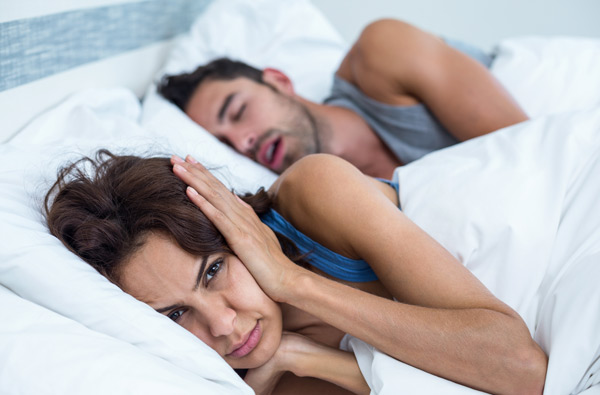What Are The Symptoms Of Sleep Apnea?
 Let's talk about the silent disruptor of your sleep. So, you know when you hit the hay, all set for a solid night of shut-eye, but somehow wake up feeling like you have been hit by a truck? One sneaky culprit behind that groggy morning vibe is none other than sleep apnea. Let's talk about the silent disruptor of your sleep. So, you know when you hit the hay, all set for a solid night of shut-eye, but somehow wake up feeling like you have been hit by a truck? One sneaky culprit behind that groggy morning vibe is none other than sleep apnea.At its core, sleep apnea is a condition where your breathing repeatedly stops and starts while you are sleeping. The two most common types of sleep apnea include central sleep apnea (CSA) and obstructive sleep apnea (OSA). In central sleep apnea, your airway gets blocked or narrowed, usually when the muscles at the back of your throat relax a bit too much during sleep. This obstruction leads to those annoying pauses in breathing that can happen multiple times throughout the night. In obstructive sleep apnea, your brain forgets to send the signal to breathe, causing those breath-holding episodes that disrupt your sleep cycle. Now that you know the basics of sleep apnea, you will better understand its symptoms. Symptoms of Sleep Apnea
Good Sleep Hygiene Practices for Sleep ApneaEstablishing a regular sleep schedule, creating a comfortable sleep environment, and practicing relaxation techniques before bed can all contribute to better sleep quality. These are the basics of keeping sleep apnea at bay. Sleep apnea can have serious health consequences if left untreated, including an increased risk of heart disease, stroke, and other health problems. Therefore, it's essential to adopt good practices to manage and mitigate the effects of sleep apnea. Here are some recommendations: Consult a Healthcare ProfessionalIf you think you have sleep apnea or are experiencing symptoms such as loud snoring, choking or gasping during sleep, excessive daytime sleepiness, or morning headaches, consult a pulmonologist promptly. They can diagnose the condition and recommend appropriate treatment options. Continuous Positive Airway Pressure (CPAP) TherapyCPAP therapy is one of the most common and effective treatments for obstructive sleep apnea (OSA). It includes wearing a mask over the nose or mouth during sleep, continuously flowing air to keep the airway open. Use Oral AppliancesFor some people with mild to moderate sleep apnea or who cannot tolerate CPAP therapy, oral appliances may be recommended. These devices are worn in the mouth during sleep and work by repositioning the jaw to keep the airway open. Maintain WeightExcess weight, especially around the neck, can contribute to obstructive sleep apnea by putting pressure on the airway. Losing weight through a combination of healthy eating and regular exercise can help reduce the severity of sleep apnea symptoms. Sedatives and Avoid Alcohol Before BedAlcohol and sedatives can relax the muscles in the throat, making it more likely for the airway to collapse during sleep and exacerbating sleep apnea symptoms. It's best to avoid alcohol and sedatives in the hours leading up to bedtime. Quit SmokingSmoking can worsen sleep apnea symptoms by increasing inflammation and fluid retention in the airway. Quitting smoking can improve overall health and reduce the severity of sleep apnea. Sleep on Your SideSleeping on your back can worsen sleep apnea symptoms by allowing the tongue and soft tissues in the throat to collapse into the airway more easily. Sleeping on your side can help keep the airway open and reduce the frequency of breathing pauses. Elevate the Head of the BedElevate your bed's head a few inches. This will help prevent the soft tissues and tongue from collapsing into your airway during sleep. You can also achieve this by using a special wedge pillow or raising the bed's top by placing blocks underneath. Regular Follow-up with Healthcare ProviderRegular follow-up appointments with your healthcare provider are essential for monitoring the effectiveness of treatment and making any necessary adjustments. This can help ensure sleep apnea is adequately managed, and any new symptoms or concerns are addressed immediately. Consider Surgical OptionsIn some cases, surgical procedures may be recommended to treat sleep apnea, particularly if other treatment options are ineffective. Surgical interventions may involve removing excess tissue from the airway, repositioning the jaw, or implanting devices to support the airway during sleep. It's important to note that not everyone with sleep apnea will experience all of these symptoms, and the severity of symptoms can vary widely among individuals. Additionally, some people with sleep apnea may not be aware of their symptoms and may only seek treatment after being prompted by a bed partner. If you suspect that you or your loved one have sleep apnea, it is essential to consult a healthcare professional for diagnosis and treatment. If left untreated, it can cause serious health complications, including cardiovascular disease, hypertension, and stroke. At Sleep Apnea Solutions of Cincinnati, we understand the profound impact sleep apnea can have on your overall health and quality of life. We recognize that every individual experiences sleep apnea differently. That's why takes a personalized approach to care, tailoring treatment plans to address your specific symptoms, lifestyle, and preferences. Contact us today to schedule a comprehensive consultation with one of our sleep specialists. Call (513) 991-2520. |